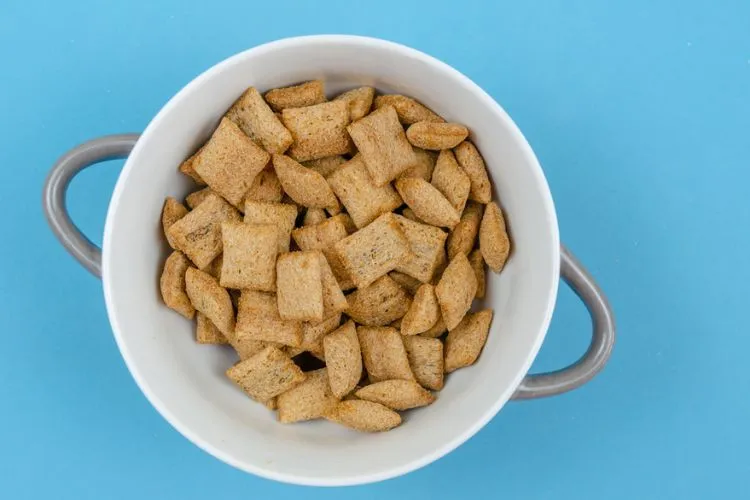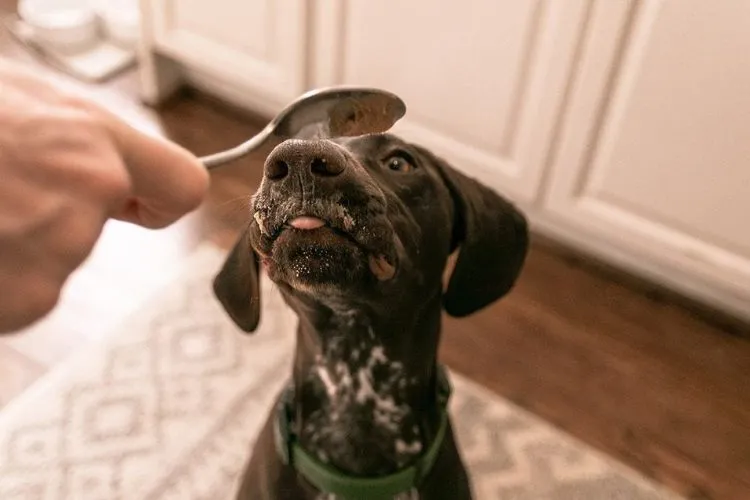Croutons might catch your dog’s eye (and nose) during mealtime. But can dogs eat croutons safely?
This article explores the safety, nutritional aspects, and potential risks of feeding croutons to dogs. We’ll examine ingredients commonly found in croutons and discuss how they align with canine dietary needs.
🐾 Can dogs eat croutons?
Yes, dogs can eat croutons in very small quantities as an occasional treat, but it’s not recommended to make it a regular part of their diet.
Croutons are typically made from bread and are often seasoned with garlic, onions, or other spices that can be harmful to dogs in large quantities.

Garlic and onions, for example, are toxic to dogs and can lead to anemia if consumed in significant amounts. Furthermore, croutons are high in calories and can contribute to weight gain.
They also offer little nutritional value to a dog’s diet. If you decide to give your dog croutons, ensure they are plain and free from any harmful seasonings.
Always introduce any new food into your dog’s diet gradually and in moderation, and keep an eye out for any adverse reactions.
🐾 Nutritional Aspects of Croutons
From a nutritional standpoint, croutons offer little to no benefits for dogs. Primarily made from processed white bread, they are high in carbohydrates and lack the essential nutrients that dogs require for a balanced diet.
Moreover, the additional seasonings and fats used to enhance their flavor can be unnecessary and potentially harmful to a dog’s health.
The caloric content, primarily derived from carbs and fats, contributes to an increased risk of obesity and related health issues in dogs when consumed in excess.
Given their nutritional profile, croutons should not be considered a beneficial treat for dogs and are best omitted from their diet.
Potential Risks of Feeding Croutons to Dogs
While croutons may seem like a harmless treat to share with your dog, several risks are associated with feeding them to canines. Understanding these risks is crucial for pet owners who aim to maintain their dog’s health and well-being.

Choking Hazard
Croutons, with their hard and crunchy texture, pose a choking hazard, especially for small dogs or those that tend to eat quickly without properly chewing their food.
The risk is compounded if the croutons are of a larger size, which can obstruct the airway and lead to choking incidents.
Digestive Issues
The ingredients commonly found in croutons, such as garlic and onion, are toxic to dogs. These ingredients can cause gastrointestinal irritation and potentially lead to more severe conditions like anemia if consumed in large quantities.
Additionally, the high fat and salt content in croutons can cause stomach upset, diarrhea, and dehydration. Regular consumption of such snacks can disrupt a dog’s digestive system and lead to long-term health issues.
Nutritional Imbalance and Obesity
Croutons are high in calories and carbohydrates but low in nutritional value for dogs. Feeding dogs croutons can contribute to an imbalance in their diet, especially if these treats replace their regular, nutritionally balanced meals.
Over time, the excessive calorie intake from treats like croutons can lead to obesity, which is associated with various health problems, including diabetes, heart disease, and joint issues.
Exposure to Toxic Ingredients
As mentioned, croutons often contain ingredients that are harmful to dogs. Beyond garlic and onions, croutons may also include artificial flavors, preservatives, and spices that are not suitable for canine consumption.
Even in small amounts, these substances can be toxic to dogs, leading to adverse health effects.
In summary, while it might be tempting to share your croutons with your furry friend, the potential risks far outweigh any momentary enjoyment they might derive from this snack.
The following section will explore safer alternative treats that can be offered to dogs, ensuring their health and safety are not compromised.
While we’re discussing if dogs can safely munch on croutons, perhaps you’re curious about other snacks. Can our four-legged friends share in our love for Tostitos or everyone’s favorite Pringles? Though these snacks may seem harmless, it’s always best to understand the potential impacts they can have on a dog’s health and diet. We delve deeper into these topics in our linked articles.
🐾 Key Takeaways on Feeding Croutons to Dogs

- Croutons Are Not Nutritionally Beneficial for Dogs: Croutons are high in carbohydrates and calories but lack the necessary nutrients that dogs require for a healthy diet. Their main ingredients, while appealing to human taste buds, do not offer any dietary benefits to canines.
- Health Risks Associated with Croutons: The potential health risks of feeding croutons to dogs include choking hazards, digestive issues due to toxic ingredients like garlic and onions, and the risk of obesity from their high caloric content. These risks highlight the importance of choosing dog-appropriate treats.
- Alternatives to Croutons: Pet owners are encouraged to seek out healthier treat options that are safe and beneficial for their dogs. Many commercially available or homemade dog treats are specifically formulated to meet the nutritional needs of canines without the risks posed by human foods like croutons.
- Consultation with Veterinarians: Before introducing any new treats or changes to a dog’s diet, consulting with a veterinarian is advisable. They can provide personalized advice based on the dog’s health, dietary needs, and any specific concerns.
Conclusion:
While sharing food with our pets is often done out of love and the desire to include them in our lives, not all human foods are safe or suitable for dogs.
Croutons, with their lack of nutritional value and potential health risks, are best kept off the menu for our canine companions.
By choosing appropriate treats and consulting with veterinary professionals, we can ensure our pets enjoy a balanced diet that supports their health and happiness.
